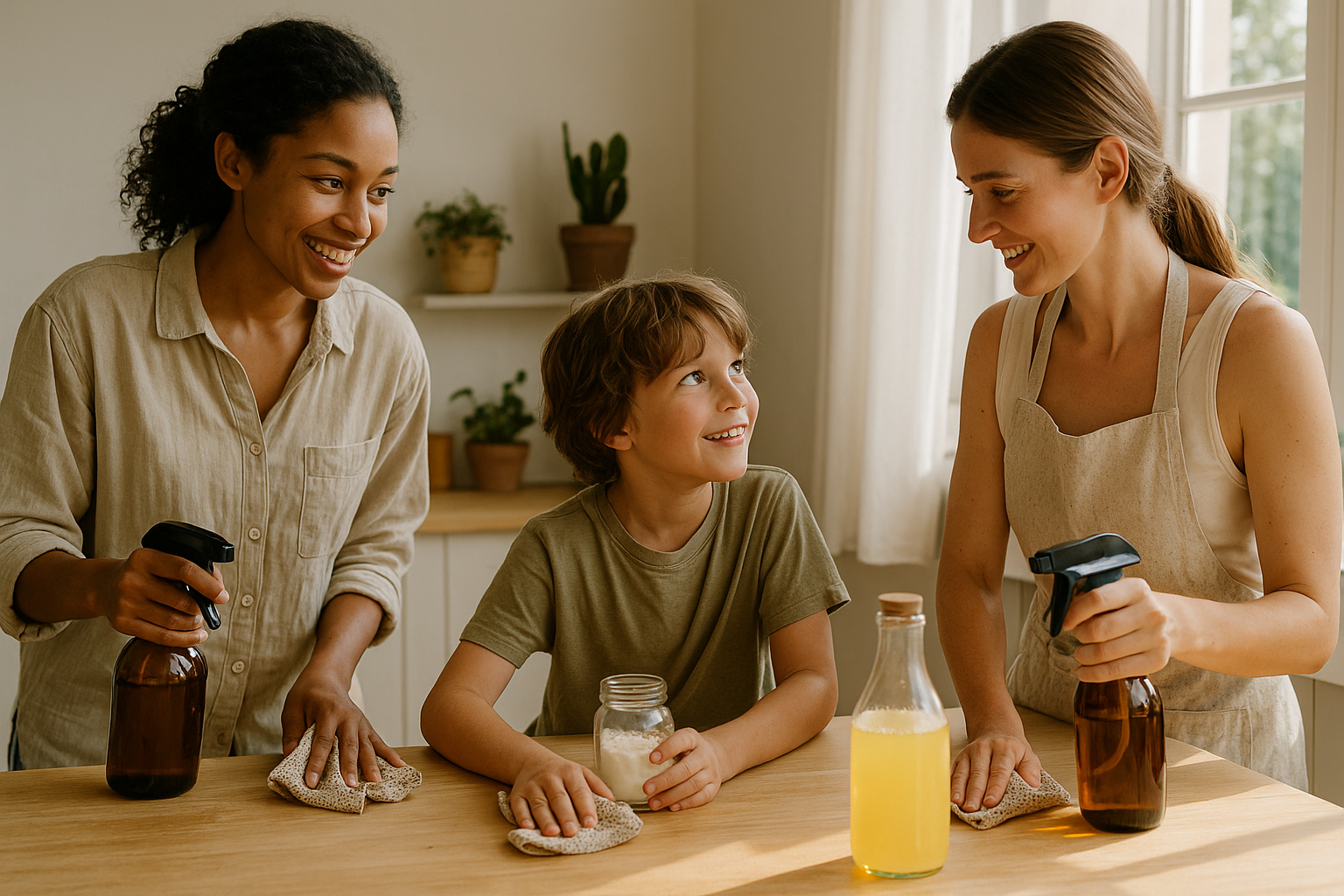Conventional cleaning products often promise a sparkling home—but many contain harsh chemicals, synthetic fragrances, and single-use plastic packaging. These products can be harmful to both your health and the environment.
Fortunately, it’s entirely possible to maintain a clean, fresh-smelling home using natural ingredients and sustainable tools. In fact, you probably already have most of what you need in your pantry.
Why Switch to Natural Cleaning?
Cleaning naturally isn’t just about removing toxins—it’s a lifestyle shift that embraces simplicity, reduces waste, and saves money.
Benefits include:
- Healthier indoor air quality
- Less skin and respiratory irritation
- Reduced plastic waste
- Lower carbon footprint
- A more mindful, minimal routine
It’s about cleaning with care—for your home, your body, and the planet.
Pantry Essentials for Natural Cleaning
These five simple ingredients can replace dozens of commercial products:
1. White Vinegar
- Disinfects, cuts grease, and removes stains
- Great for windows, countertops, and floors
2. Baking Soda
- Deodorizes and scours tough grime
- Perfect for sinks, tubs, and stoves
3. Lemon
- Cuts through grease and leaves a fresh scent
- Acts as a natural antibacterial agent
4. Castile Soap
- A gentle, plant-based all-purpose soap
- Safe for most surfaces (even skin!)
5. Essential Oils (optional)
- Add fragrance and antimicrobial properties
- Popular choices: tea tree, eucalyptus, lavender, lemon
No need for an overflowing cabinet—these ingredients cover almost everything.
DIY All-Purpose Cleaner Recipe
A simple, effective spray for most household surfaces:
You’ll need:
- 1 cup white vinegar
- 1 cup water
- 10–15 drops of essential oil (optional)
- Spray bottle (preferably glass)
Mix, shake gently, and label. Avoid using vinegar on natural stone surfaces like granite or marble.
Surface-Specific Cleaning Tips
Kitchen
- Degrease with vinegar + lemon
- Sprinkle baking soda on tough spots before scrubbing
- Disinfect cutting boards with lemon juice and salt
Bathroom
- Remove toilet stains with baking soda + vinegar
- Shine mirrors with vinegar and newspaper
- Keep drains fresh with a mix of baking soda + hot water
Floors
- Mix 1/2 cup vinegar with 4 liters of water for tile or laminate
- Use mild castile soap and warm water on wood (avoid too much moisture)
Glass and Mirrors
- Use vinegar + water + a soft cloth
- Buff with a dry microfiber towel for a streak-free finish
Sustainable Tools to Use
Swap disposables for reusables:
| Disposable | Sustainable Alternative |
|---|---|
| Paper towels | Washable cotton cloths |
| Sponges | Compostable or natural fiber versions |
| Plastic brushes | Bamboo or wooden scrub brushes |
| Mop pads | Reusable microfiber pads |
| Rubber gloves | Durable latex or biodegradable gloves |
Choose items that last—and when they wear out, compost or recycle them if possible.
Reduce Packaging Waste
Choose to buy your cleaning ingredients in bulk or from refill stations. Even better, reuse containers you already have.
Tips:
- Refill vinegar, soap, and oils at zero-waste stores
- Repurpose old glass jars and bottles
- Avoid individually wrapped cleaning wipes and pods
Packaging is often the most wasteful part of cleaning products—cut it out where you can.
Natural Air Freshening Ideas
Skip synthetic sprays and opt for non-toxic options.
Try:
- Simmering citrus peels and herbs on the stove
- A bowl of baking soda with essential oils
- Beeswax or soy candles
- Indoor plants to purify the air
Let your home smell clean, not chemically “fresh.”
Teach and Involve the Household
Make sustainable cleaning a shared routine. Even kids can help mix ingredients or wipe surfaces.
- Create labeled spray bottles for everyone to use
- Schedule family cleaning time with music and fun
- Use simple language to explain why you clean naturally
Sustainability becomes stronger when it’s practiced together.
Clean Less, Live More
Ironically, living sustainably often leads to needing less cleaning. When you own fewer things, avoid toxic products, and bring nature inside, your home naturally stays healthier and easier to maintain.
Cleaning becomes less about scrubbing and more about care—a routine that’s calming, conscious, and kind to the earth.
